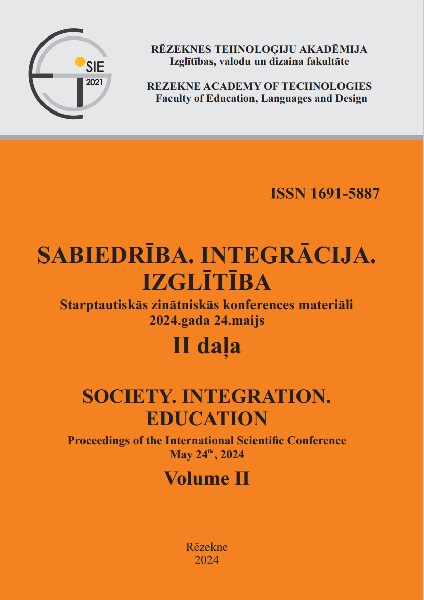MODELS OF PROFESSIONAL DEVELOPMENT FOR BIOLOGY TEACHERS IN THE CONTEXT OF SOCIAL CHANGES
DOI:
https://doi.org/10.17770/sie2024vol2.7868Keywords:
continuous learning, innovative technologies, model of professional development for biology teachers, models of professional development, pedagogical mastery, professional development environment, professional development of biology teachers, qualification enhancementAbstract
This article aims to explore the impact of social changes on the professional development of biology teachers. The purpose of the study is the analysis of modern challenges in the field of education and the development of a model of professional growth of a biology teacher. The following methods are employed in the study: analysis and synthesis of literature on the research topic to determine the current state of the investigated problem, systematic analysis, and synthesis of obtained information to identify the main models of professional development for biology teachers.
The regulatory framework ensuring conditions for the professional development of teachers has been analyzed. Modern economic and technological changes, socio-cultural and political transformations, dynamics of interethnic and cultural relations in Ukraine, high population mobility, and migration processes affect the education system and the professional development of teachers.
In the scientific discourse, among effective models of professional development for teachers, scholars distinguish: concepts of teaching and development of teachers' professional abilities based on knowledge (knowledge for practice, knowledge in practice, personal knowledge); models of professional development for educators (training model, award-bearing model, deficit model, cascading model, standards-based model, coaching/mentoring model, community of practice model, action research model, transformational model); competency, cognitive, human-centered models; models of applied science, craftsmanship, reflective, apprentice-expert model, rationalist model, case studies model, cascading.
The author proposes an original model of professional development, which involves six stages: analysis of contemporary challenges, professional training based on teachers' needs, creation of an individual development plan, integration of innovative technologies into professional activities, self-evaluation, and the establishment and support of professional communities.
The main research results indicate the need to reconsider traditional approaches to teaching biology and emphasize the use of modern technologies in the professional development of teachers for successful implementation of changes in the educational environment.
References
Berns, M. (2011). Distance Education for Teacher Training: Modes, Models and Methods. Washington: Education Development Center, 327. Retrieved from: https://www.researchgate.net/publication/259440600_Distance_Education_for_Teacher_Training_Modes_Models_and_Methods
Cochran-Smith, M., & Lytle, S. L. (2001). Beyond certainty: taking an inquiry stance on practice. In Lieberman, A., & Miller, L. (Eds.), Teachers Caught in the Action: Professional Development that Matters. New York: Teachers College Press.
Dubasenyuk, O. A. (2018). Modern Models of Professional Training for Pedagogues-Andragogues. Conceptual Foundations of Adult Education Development: Global Experience, Ukrainian Realities, and Perspectives, 174-180.
Kennedy, A. (2005). Models of Continuing Professional Development: A Framework for Analysis. Journal of In-service Education, 31(2), 235-250.
Kovalchuk, V., Vorotnikova, I. (2017). E-coaching, E-mentoring for Lifelong Professional Development of Teachers within the System of Post-graduate Pedagogical Education. Turkish Online Journal of Distance Education, 214–227.
Kovalchuk, V. (2015). Teaching Staff Advanced Training: European Experience. Comparative Professional Pedagogy, 5(3), 25–31.
Kovalchuk, V., Shevchenko I. (2021). Experience of Introducing Cloud Technologies. Society. Integration. Education. Proceedings of the International Scientific Conference, 1, 339–348.
Kovalchuk, V. (2018). Professional Development of Pedagogical Workers in the Conditions of the Information Society. Open Education: Innovative Technologies and Management, Kyiv, InterService, 133-157.
Kovalchuk, V. I., Maslich S. V. (2020). Creation of the environment of professional development of pedagogical workers of the institution of vocational education. Bulletin of Glukhiv NPU named after O. Dovzhenko, 2(43), 29–37.
Kurish, N. (2022). Modeling Professional Development of Pedagogical Workers in the System of Postgraduate Pedagogical Education. Viae Educationis, 1, 65-72.
Law of Ukraine "On Complete General Secondary Education." (2020). Retrieved from: https://zakon.rada.gov.ua/laws/show/463-20#Text
Law of Ukraine "On Education." (2017). Retrieved from https://zakon.rada.gov.ua/laws/show/2145-19#Text
Procedure for Qualification Enhancement of Pedagogical and Scientific-Pedagogical Workers. (2019). Retrieved from: https://zakon.rada.gov.ua/laws/show/800-2019-%D0%BF#Text
Pukhovska, L. P. (2022). Models of Professional Development of Teachers: Structural Modifications. Comparative and International Education. Book of Abstracts of the 6th International Conference, Kyiv, 222-226.
Vorotnikova, I. (2018). Models of Professional Development of a Teacher in the Context of Postgraduate Pedagogical Education Reform. Continuous Professional Education: Theory and Practice, 3(4), 21-27. Retrieved from: http://nbuv.gov.ua/UJRN/NPO_2018_3-4_5.






